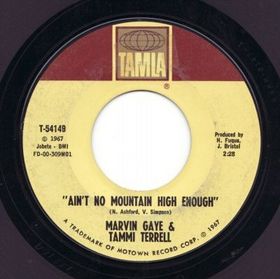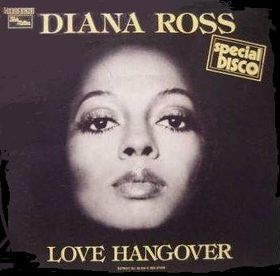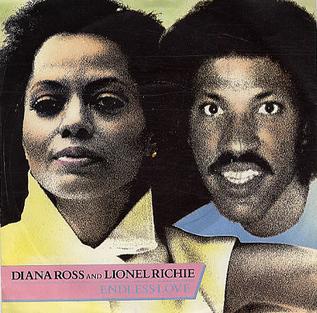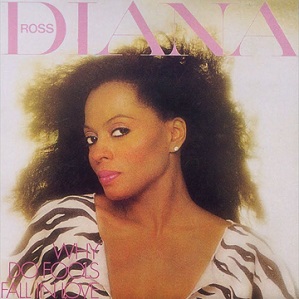
"Stop! In the Name of Love" is a 1965 song recorded by the Supremes for the Motown label.

"Reflections" is a 1967 song recorded by The Supremes for the Motown label. It was the first Supremes record credited to "Diana Ross and the Supremes", and among their last hit singles to be written and produced by Holland–Dozier–Holland (H–D–H), Motown's main production team.

"Baby Love" is a song by American music group the Supremes from their second studio album, Where Did Our Love Go. It was written and produced by Motown's main production team Holland–Dozier–Holland and was released on September 17, 1964.

"Love Child" is a 1968 song released by the Motown label for Diana Ross & the Supremes. The second single and title track from their album Love Child, it became the Supremes' 11th number-one single in the United States, where it sold 500,000 in its first week and 2 million copies by year's end.

"I Hear a Symphony" is a 1965 song recorded by the Supremes for the Motown label.

"You Keep Me Hangin' On" is a song written and composed by Holland–Dozier–Holland. It was first recorded in 1966 by American Motown group the Supremes, reaching number one on the Billboard Hot 100. American rock band Vanilla Fudge released a cover version in June the following year, which reached number six on the Billboard Hot 100. English singer Kim Wilde covered "You Keep Me Hangin' On" in 1986, reaching number one on the Billboard Hot 100 in June 1987. In the first 32 years of the Billboard Hot 100 rock era, "You Keep Me Hangin' On" became one of the six songs to reach number one by two different musical acts. In 1996, American country singer Reba McEntire's version reached number two on the US Billboard Hot Dance Club Play chart. The BBC ranked the Supremes' original song at number 78 on The Top 100 Digital Motown Chart, which ranks Motown releases by their all-time UK downloads and streams.

"I'm Gonna Make You Love Me" is a soul song most popularly released as a joint single performed by Diana Ross & the Supremes and The Temptations for the Motown label. This version peaked for two weeks at No. 2 on the Hot 100 in the United States, selling 900,000 copies in its first two weeks, and at No. 3 on the UK Singles Chart in January 1969.

"Ain't No Mountain High Enough" is a song written by Nickolas Ashford & Valerie Simpson in 1966 for the Tamla label, a division of Motown. The composition was first successful as a 1967 hit single recorded by Marvin Gaye and Tammi Terrell, and became a hit again in 1970 when recorded by former Supremes frontwoman Diana Ross. The song became Ross's first solo number-one hit on the Billboard Hot 100 chart and was nominated for the Grammy Award for Best Female Pop Vocal Performance.

"Love Hangover" is a song by the Motown singer Diana Ross, recorded in 1975 and released as a single on March 16, 1976. It rose to number one on the Billboard Hot 100 and Hot-Selling Soul Singles. It also hit number one on the Record World disco charts.

"I'm Livin' in Shame" is a 1969 song released for Diana Ross & the Supremes on the Motown label. The sequel to the Supremes' number-one hit, "Love Child," the song peaked in the top ten on the US Billboard Hot 100 pop chart at #10 and the top 20 in the UK at #14 in April and May 1969.

"Endless Love" is a song written by Lionel Richie and originally recorded as a duet between Richie and singer/actress Diana Ross. It is Richie's first single after leaving Commodores. In this ballad, the singers declare their "endless love" for one another. It was covered by Luther Vandross with R&B-pop singer Mariah Carey, and also by country music singer Shania Twain. Richie's friend Kenny Rogers also recorded the song. Billboard has named the original version as the greatest song duet of all time.

"Love Is Here and Now You're Gone" is a 1967 song recorded by the Supremes for the Motown label.

"Why Do Fools Fall in Love" is a song by American rock and roll band Frankie Lymon & the Teenagers that was released on January 10, 1956. It reached No. 1 on the R&B chart, No. 6 on Billboard's Pop Singles chart, and No. 1 on the UK Singles Chart in July. Many renditions of the song by other artists have also been hit records in the U.S., including versions by the Diamonds, the Beach Boys, and Diana Ross.

The discography of American rhythm and blues singer Diana Ross, the former lead singer of the Supremes, consists of 25 studio albums and 116 singles. Throughout her career, Ross has sold over 100 million records worldwide. Billboard ranked her as the 47th Greatest Artist of all time and the 11th Greatest Hot 100 Female Artist of all time. In 1993, Guinness World Records crowned Ross as the "most successful female artist in music history". Her 11th studio album "Diana" remains the best-selling album of her career, selling more than 10 million copies around the world.

Why Do Fools Fall in Love is the twelfth studio album by American R&B singer Diana Ross, released on September 14, 1981, by RCA Records. It was Ross' first of six albums released by the label during the decade. It peaked at No. 15 in the United States, No. 17 in the United Kingdom and the top ten in Sweden, Norway and the Netherlands.

Swept Away is the fifteenth studio album by American R&B singer Diana Ross, released on September 13, 1984, by RCA Records in North America and by Capitol Records in Europe. It was Ross' fourth of six albums released by the label during the decade.

"Love Is Like an Itching in My Heart" is a 1966 song recorded by the Supremes for the Motown label.

"Swept Away" is a song by American R&B singer Diana Ross for her album of the same name. Ross released the song as the album's second single on August 14, 1984 by the RCA. It was written by Daryl Hall, Sara Allen and produced by Hall and Arthur Baker. Ross wrote the spoken lyrics at the beginning of the song and Hall also provided background vocals on it.

"Where Did Our Love Go" is a 1964 song recorded by American music group the Supremes for the Motown label.

"Work That Body" is a song by American singer Diana Ross recorded for her eleventh studio album Why Do Fools Fall in Love (1981). The song was written by Ross, Paul Jabara and Ray Chew. The song was written during the popularity of aerobics classes.




















